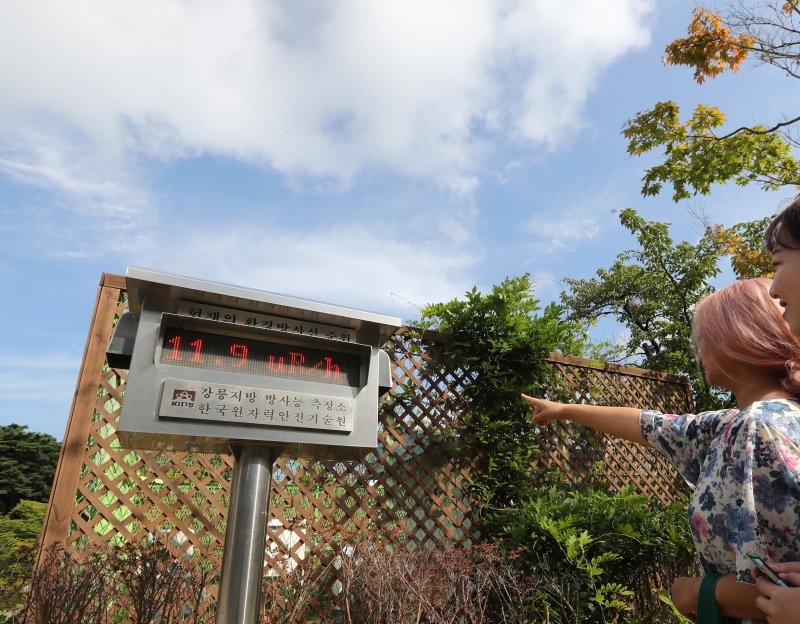People take a look at radiation levels at the state-run Korea Institute of Nuclear Safety in Gangneung, on South Korea's eastern coast, on Monday, the day after North Korea detonated a hydrogen bomb. Photo by EPA
SEOUL, South Korea, Sept. 8 (UPI) -- A North Korean defector told UPI in an interview in Seoul that he hates Kim Jong Un -- but he hates his new life in South Korea more.
The former deputy chief at Pyongyang's Ministry of People's Security, who spoke on the condition of anonymity, said he is proud of North Korea's nuclear weapons.
The country conducted its sixth nuclear test on Sunday.
While he did not express a desire to return, the man said he has become disillusioned with South Korea after resettling in 2012.
He joins a growing plurality of views as more North Koreans resettle in the South and share more insights into the workings of the Kim regime.
The middle-age defector said Pyongyang's elites remain loyal to Kim because they "reap benefits" from the state. He still has family with elite status in the North, including a son serving in the North Korean army.
Some of the most public defectors -- Shin Dong-hyuk, Kang Chol-hwan and Lee Hyun-seo, among others, have spoken out about human rights abuses, economic deprivation and increasing troubles the regime faces as it struggles to stay in power.
Others decry discrimination against defectors in South Korea and the stark cultural differences they find there.
Five years into his resettlement, the defector says the social environment is so different from the North that calls for unification no longer ring true for him.
"It's better there is no unification," he said. "If unification takes place now, only civil war and chaos would erupt," as South Korea is not ready to deal with a flood of refugees coming to Seoul in the event of the Kim regime's collapse.
He said discrimination is an obstacle and his fellow defectors struggle in menial jobs.
It is frosty indifference that is the greatest barrier to adjustment, he said, suggesting the real "nuclear" catastrophe on the peninsula has already happened with the nuclearization of Korean lives.
South Koreans "take no interest in your life," he said. "There is not one person who wants to be your friend. In apartment buildings here, they do not even know who their next-door neighbors are."
By contrast, in North Korean apartment communities, families "gather on the rooftop to play together, drink soju together and eat," he said. "In South Korea you cannot have that kind of enjoyment. South Koreans only seek you out when they need you."
He also criticized South Korea's politics.
"South Korea has no ideology of its own," he said.
"I came hoping to contribute to the healing of a divided country...but after living here I think it's accurate to say South Koreans are [American] puppets," he added, using the term commonly used to refer to South Korea in North Korea propaganda.
He also said South Koreans fear being at odds with the United States. "That's why Americans don't even regard [South] Koreans as human beings, or Asians in general," he said.
Days before, news reports of the rally of white nationalist and other right-wing groups in Charlottesville, Va., was a top news story in Korea.
"North Koreans have more pride than South Koreans," he said. "They have reason to say they want to go back to the North."
Defectors, however, rarely opt to return because of the risks of punishment.
Claims of rape and torture have come to light in memoirs, testimonies before the United Nations and countless press conferences in Seoul and Washington, D.C.
But even those claims, he said, are not entirely reflective of North Korean reality.
"There's too much focus on North Korea's human rights abuses, too little on how it is a society constructed for the people," he said, adding the defectors who expose human rights violations represent the worst of North Korean society.
"If you only bring together people who spent time in prison, all you get is the gutter," he said, adding that many defector testimonies in United Nations Commission of Inquiry reports are "lies."
"They should all be put away."
He said the exaggerations continue in the accounts of high-profile defector Thae Yong-ho, and that Thae's claim of household wiretapping is an "irresponsible declaration" that is untrue.
"If North Korea is so economically backward, how can they have the technology to eavesdrop on everyone?" he said, challenging the claim North Koreans are dedicated to the regime because they are under surveillance.
"People are loyal because they are provided for."
When asked about the impact the infiltration of foreign and South Korean media into North Korea is having on the people, he said "they watch a lot" of pirated South Korean television in the North.
"North Korea is trying to block out the capitalist system," he said.
Other defectors have advocated for an increase in information flows into North Korea and to engage directly with the North Korean people through media.
"All regimes are insecure," and not just North Korea, he added, while defending the country's military.
"North Korea is justified in its development of nuclear weapons," he said, because the prospect of war with the United States is real and the North Korean leader won't bend to U.S. President Donald Trump's wishes.
"It was not easy for Kim Jong Un to acquire power. He'd rather die than give up power."















